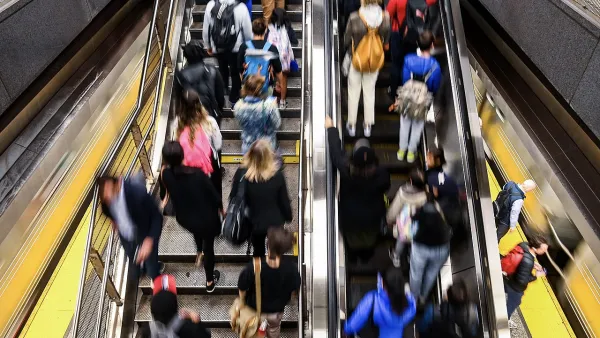From stop-and-frisk to sugary sodas to popular pedestrian plazas, The New York Times reviews the positions of NYC's candidate pool on the important issues -- many of them planning-related -- facing the Big Apple's next mayor.

The candidates have weighed in on several major issues as the race has heated up. This feature from The New York Times runs the gamut of issues that the next mayor will have authority over.
Notably, Anthony Weiner has said that he would keep the pedestrian plazas implemented by Janette Sadik-Khan, but only if they do not add to congestion: "When Mayor Bloomberg and transportation officials introduced pedestrian plazas to the city's streetscape, they hailed the spaces for their ability to reduce traffic and cut air pollution. But Mr. Weiner appears unconvinced, saying that he would support more plazas, but not at the 'cost of additional congestion and pollution.'"
When it comes to parks, most of the candidates agree that leasing public land for a soccer stadium would not be a good idea, though the Republicans on the ticket and Anthony Weiner say they would consider it.
The city's popular bike lanes get the campaign trail treatment, as well. Most of the candidates say they would expand or maintain them, while the Republicans and Weiner on the ticket appear to have some hostility toward the lanes and the Citi Bike bike share program. Former MTA chairman Ray Lhota replied, "...that he would increase the number of lanes, though he called for 'common sense in their placement.' In the past, he has said that he 'could see' removing existing lanes that he deemed problematic, mentioning that some bus drivers along the B63 route in Park Slope, Brooklyn, had complained about sharing space with bike riders."
FULL STORY: Where the Mayoral Candidates Stand on Key Issues

Planetizen Federal Action Tracker
A weekly monitor of how Trump’s orders and actions are impacting planners and planning in America.

Chicago’s Ghost Rails
Just beneath the surface of the modern city lie the remnants of its expansive early 20th-century streetcar system.

Amtrak Cutting Jobs, Funding to High-Speed Rail
The agency plans to cut 10 percent of its workforce and has confirmed it will not fund new high-speed rail projects.

Ohio Forces Data Centers to Prepay for Power
Utilities are calling on states to hold data center operators responsible for new energy demands to prevent leaving consumers on the hook for their bills.

MARTA CEO Steps Down Amid Citizenship Concerns
MARTA’s board announced Thursday that its chief, who is from Canada, is resigning due to questions about his immigration status.

Silicon Valley ‘Bike Superhighway’ Awarded $14M State Grant
A Caltrans grant brings the 10-mile Central Bikeway project connecting Santa Clara and East San Jose closer to fruition.
Urban Design for Planners 1: Software Tools
This six-course series explores essential urban design concepts using open source software and equips planners with the tools they need to participate fully in the urban design process.
Planning for Universal Design
Learn the tools for implementing Universal Design in planning regulations.
Caltrans
City of Fort Worth
Mpact (founded as Rail~Volution)
City of Camden Redevelopment Agency
City of Astoria
City of Portland
City of Laramie





























